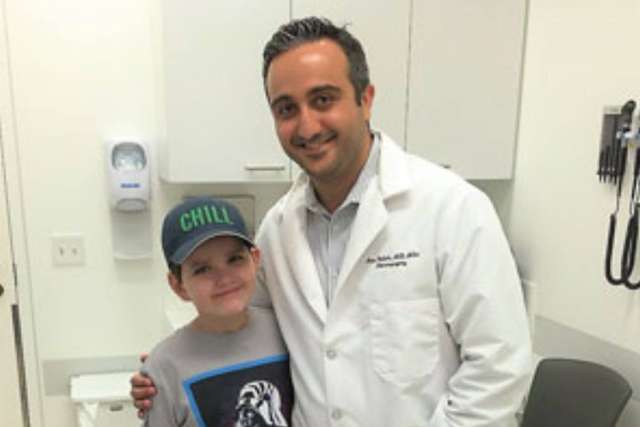Brain seizures
In October 2015, seven-year old Brock tumbled to the ground in his home as a tonic-clonic seizure hijacked his brain and paralyzed his body.
Since birth, seizures plagued his childhood. But his parents, Ben and Tiffany Cheeseman, knew this seizure threatened to steal his life. It took the emergency room doctors three different rescue medication attempts to pull Brock out of the seizure. Twenty-four long minutes later, they revived Brock at a local hospital near their home in Hemet.
After, Brock was transferred to UCLA Mattel Children’s Hospital. His pediatric neurologist at UCLA, Dr. Christopher Giza, admitted Brock for a week of video-EEG monitoring to track and record the seizure activity in his brain. They discovered his brain was seizing nearly all the time with sub-clinical seizures that showed no visible signs of this abnormal brain activity. In addition, he suffered from partial complex seizures that they could see when he shook and lost consciousness. Dr. Giza adjusted Brock’s medications and gently made another recommendation for Brock’s parents to consider brain surgery as a treatment option. Brock’s father, Ben, had been against surgery.
“Surgery is very permanent, and if there were other avenues we wanted to be able to pursue them first,” Ben said. “But what ultimately ended up happening was Brock kept on seizing, even with his new medications.”
Brock began to regress in his school academics and behavior. His reading, spelling and comprehension skills weakened as the seizures intensified daily. He was on a heart-monitor at night. The seizures usually erupted between 3 and 6 a.m. His unrelenting exhaustion led to daily meltdowns. His short-term memory waned and he no longer had the energy to play. Tiffany and Ben recognized Brock would fall more often due to his diminishing strength on his right side.
“It was a nightmare, we were in and out of the hospital, desperately adjusting his medications,” said Tiffany. “Brock lost his ability to read. The seizures were just taking everything away from him.”
Dr. Giza arranged for the Cheeseman family to meet Dr. Aria Fallah, pediatric neurosurgeon specializing in epilepsy in the UCLA Department of Neurosurgery. Prior to meeting with him, Tiffany researched Dr. Fallah online and watched a webinar video of Dr. Fallah explaining surgical options for children with epilepsy. As Tiffany listened to Dr. Fallah and noticed his calm demeanor, she began to realize that surgery could be the right decision for Brock.
“When we met Dr. Fallah, I recognized instantly how kind, thoughtful and genuine he was,” Tiffany said. “He gave such a warm handshake, and he talked to Brock, and took his time with us. We could feel how much Dr. Fallah genuinely cares for our child. We had a laundry list, two-pages, of questions. He answered all of our questions. And, he even asked how we were doing, knowing that it’s difficult for us as parents.”
Brock underwent the evaluations to test the right and left hemispheres of his brain to pinpoint the exact location of the seizures. Dr. Fallah concluded that Brock was a good candidate for hemispherectomy, a surgical procedure that would involve disconnecting the dysfunctional left hemisphere and removing areas causing the seizures. The right hemisphere of his brain was in Dr. Fallah’s words “perfect.” The hemispherectomy would give the right hemisphere of his brain a chance at neuroplasticity, the brain’s natural ability to rewire its functions using one side of the brain.
On the morning of February 12, 2016, Ben, Tiffany and Brock met with Dr. Fallah in the pre-operation area of Mattel Children’s Hospital at UCLA. “Is there anything I can do for you? Can I get you a PowerBar?” Ben asked Dr. Fallah. “I slept very well. Today is a good day,” Dr. Fallah replied calmly. “Dr. Fallah made me feel so much better with those few short sentences,” Ben reflected. “Dr. Fallah is very measured, calm and collected. And that is very assuring to someone who is worried.” Tiffany accompanied Brock into the operating room. She stayed with him until they placed the mask and the anesthesia lulled him to sleep.
“That was the hardest part having to leave him in the operating room,” Tiffany said. “And that's where we had to have total trust in Dr. Fallah, and know that he had the ability to make our son better.” Dr. Fallah and his team worked for hours to repair Brock’s brain. They kept the Cheesemans informed as they moved through the operation. Ten hours later, Brock awoke in the recovery room and spoke immediately, much to the relief of his parents at his bedside. The seizures stopped and Brock recovered from surgery. As the right side of his brain began to rewire, Brock underwent speech therapy, occupational therapy, physical therapy, and later adaptive physical education to boost the neuroplasticity and continue recovery.
“It’s like he’s a different kid,” Ben said. “There is so much curiosity in him that was not there before. Brock is so inquisitive now about everything. We read ‘Harry Potter and The Sorcerer’s Stone’ and he asks so many questions, and he loves to play again. We are so grateful to Dr. Fallah and Dr. Giza. They are brilliant and down to earth. We've assembled a phenomenal, world-class team of doctors at UCLA for Brock.” Six months post-surgery, Brock continues to live seizure-free for the first time in his life. In a way, it’s like a rebirth.
“Brock is a different child, he's just doing remarkably well,” Tiffany said, as emotion welled up. “It’s changed all of our lives. Dr. Fallah made all the right disconnections because we aren't having any seizures. And, Brock’s incision healed fantastic. We definitely made the right decision in picking Dr. Fallah as our neurosurgeon, because he is not only an excellent doctor, but he's an excellent person.”
